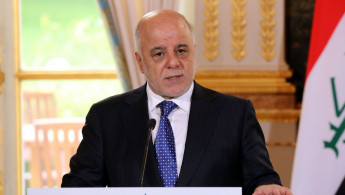Iraq says it will reluctantly abide by Iran sanctions
Iraqi Prime Minister Haider al-Abadi said on Tuesday despite regrets about the renewed US sanctions on Iran, Baghdad will comply by the terms of the embargo.
"We don't support the sanctions because they are a strategic error, but we will comply with them," he said. "In general, sanctions are unjust."
The US has threatened countries and companies that deal with Iran, once the new sanctions were announced Tuesday.
Iraq is an important trading partner for Iran and is the second-largest importer of Iranian non-hydrocarbon products.
Iraqis spent around $6 billion worth of goods from its eastern neighbour in 2017.
Of more concern, Iran also buys Iranian-generated electricity to help cope with chronic power cuts, which have led to mass protests over the summer.
"We are committed to protecting our people and their interests," Abadi said.
Baghdad is allied to both Iran and the US and relied on both powers for its victory over the Islamic State group in 2017.
Iran is also a key player in Iraqi politics and has huge influence over leading political figures and paramilitary forces and militias.
Iranian companies recently cut off power supplies to Iraq's oil-rich coastal province of Basra over outstanding payments.
Washington re-imposed tough sanctions on Iran on Tuesday, which were eased under the 2015 nuclear deal with Tehran.
The US sanctions target Iran's access to US banknotes and key industries, including cars and carpets.
A second wave of even tougher sanctions will begin on 5 November, targeting Tehran's oil and gas sector and the Central Bank.
Iran is already suffering from high unemployment and inflation, and sanctions will undoubtedly hurt the Iranian economy further.
The Iranian rial has lost nearly half its value since April.
Iraqis remember the harsh sanctions they suffered through, beginning in 1990 after Saddam Hussein invaded Kuwait.





 Follow the Middle East's top stories in English at The New Arab on Google News
Follow the Middle East's top stories in English at The New Arab on Google News


